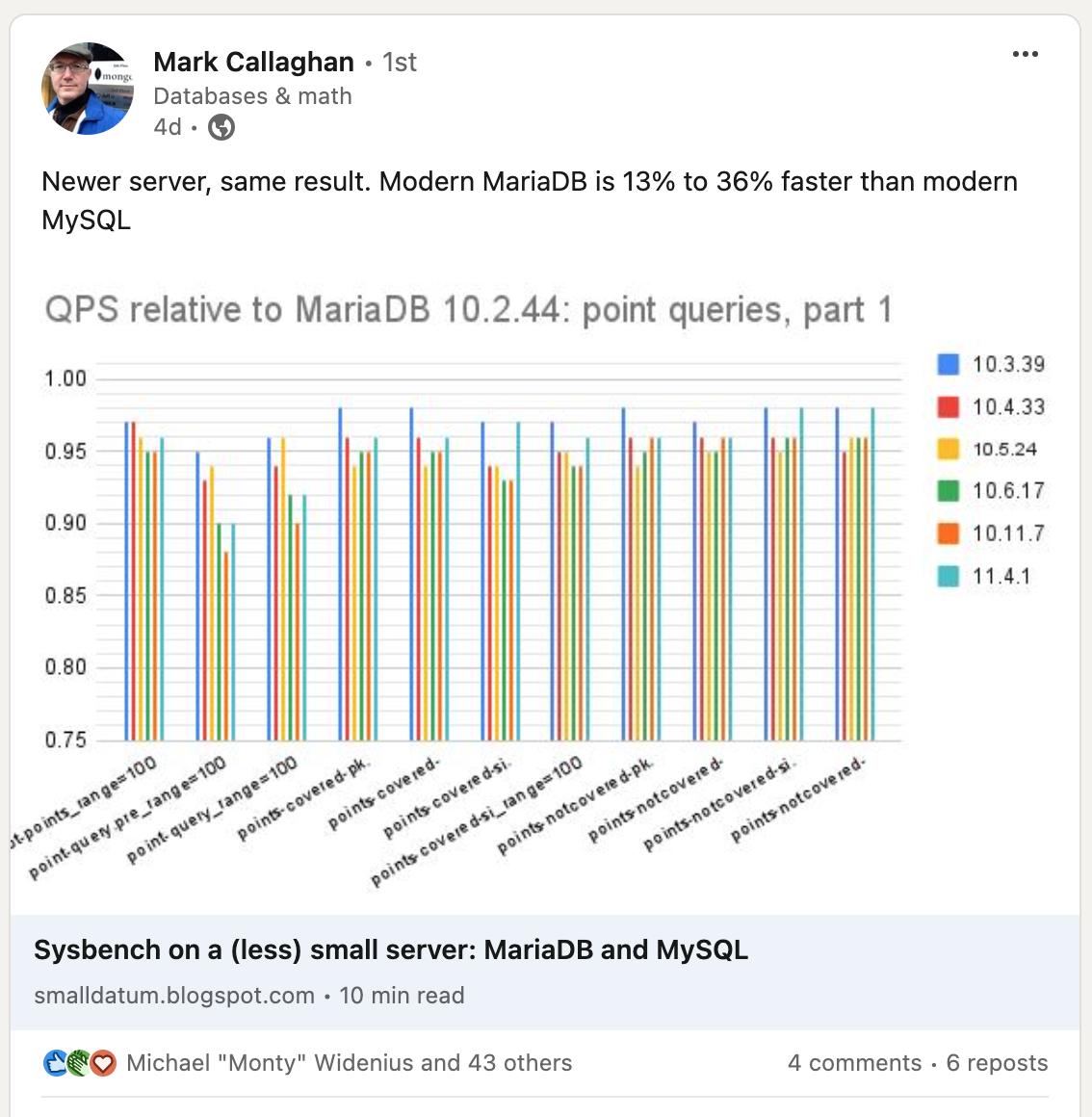Tag Archives: MySQL 5.7
Is performance important for you, along with the latest features and long-term support? Go with MariaDB 11.4. But don’t take our word for it. We asked well known benchmarking expert Mark Callaghan to check out a number of MariaDB and MySQL releases, hit them hard with a tool of his choice, and share his findings.
MariaDB’s performance is stable over the years
The outcome: On the low concurrency load (high concurrency results are being prepared), MariaDB maintained stable performance over the last 10 years and 14 releases, while MySQL performance dropped almost by a third.
…
Continue reading “How MariaDB and MySQL performance changed over releases”
In this blog we will explore how to setup a docker compose file in order to migrate from MySQL 5.7 to the latest MariaDB.
In the next blog we will explain how to setup a docker compose file to migrate from MySQL 8.0 to MariaDB.
The steps to migrate from MySQL 5.7 to MariaDB are:
- Start container by running docker-compose file
- Use the MySQL data directory and start MariaDB with MARIADB_AUTO_UPGRADE=1
Let’s explore each step.
1. Start MySQL
The MySQL container is started using the following docker-compose file.
…
Remember our open letter, Looking for MySQL 5.7 or 8.0 guinea pigs?
We caught a nice German guinea pig!
We caught a nice guinea pig, a German one, from Hannover. They are currently using MySQL 5.7 (as was our prime wish), and they will be doing a live migration to MariaDB 10.11. They have 1.000.000.000 queries a day, their database size is 412 GB, and our goal is to the migration of the production data in less than five minutes – during our MariaDB Migration Workshop at our pre-FOSDEM event on Friday 2 Feb 2024.
…
Dear users of MySQL 5.7 (or 8.0)!
Are you interested in getting help migrating to MariaDB 10.6 or 10.11, the latest long-term support releases? Are you coming to Brussels for FOSDEM in February? Do you have an open attitude, not minding to show a bit of dirty laundry in front of other users?
Then you may be a perfect candidate for our MariaDB Migration Workshop at our pre-FOSDEM event on Friday 2 Feb 2024. The workshop will be led by none other than the father of both MySQL Server and MariaDB Server, namely Michael “Monty” Widenius.
…
I had the honor of leading a session on Saturday, during the MariaDB Developers Meeting in Amsterdam, brainstorming around MariaDB Server 10.3. It’s definitely time to do that since MariaDB Server 10.2 has entered beta stage. In case you have missed that, I’ve wrapped up what’s included in 10.2 so far in a blog post on my employer’s site. In addition to the features mentioned in that blog post there are a couple of features still coming in 10.2 of which the most notable is that the MyRocks engine will be included. More about this later in another article. …
When you have read my previous blog post about MariaDB 10.1 GA performance, you have probably wondered why I didn’t include any numbers for MySQL 5.7. There are two reasons: first MySQL wasn’t GA at that time and secondly MySQL is not running stable on Power8.
Today I will come up with a comparison benchmark. I have chosen some more down-to-earth hardware for that because that is what the majority of our users will be running. Specifically it’s a SP-64 cloud machine from OVH. It has a 4-core Intel CPU and 64G of RAM. Disks aren’t fancy, but the benchmark is again a simplified read-only OLTP workload that runs from memory. …
Continue reading “MariaDB 10.1 and MySQL 5.7 performance on commodity hardware”
Introduction
Evaluating the performance of database systems is a very demanding task. There are a lot of hard choices to be made, e.g.:
- What operating system and operating system version is to be used
- What configuration setup is to be used
- What benchmarks are to be used and how long are the warm-up and measure times
- What test setups are to be used
- What version of the database management system is used
- What storage engine is used
While performance evaluation is mostly machine time, there is still a lot of hard work for the human monitoring the tests. …
Continue reading “Performance evaluation of MariaDB 10.1 and MySQL 5.7.4-labs-tplc”



